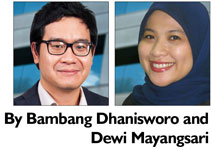 This year’s In-House Community in Indonesia was represented by Financial Services (23.1 percent), Energy/Natural Resources (21.5 percent) and Technology, Media and Telecommunications (20 percent) first, second and third-most, respectively. The same three sectors had the highest representation last year. Team size The majority of respondents (55.7 percent) are under the impression that their in-house teams will grow over the next 12 months, while 41 percent believe their teams will remain the same size and the remaining 3.3 percent expect them to shrink. Asked why they felt as they did, those anticipating expansion pointed to their businesses getting larger and plans for large projects in the near future. Those claiming their teams would stay the same size mentioned that the size of their company would remain stagnant and said that cost was a concern. The foremost answer as to why respondents expect their teams to get smaller was mergers. Recruitment KEY ISSUES AND CONCERNS Others, more specifically, said that planning for the forthcoming ASEAN integration was a concern for them, though for many, the recent economic uncertainties will have likely retrained their focus. Indonesia’s In-House Community believe that new government policies and regulations will require the most attention from them over the coming 12 months, as well as continuing to ensure compliance with the various rules and regulations. All saw keeping up with the pace of development in Indonesia, both in terms of its market and legal structure, as a challenge. Working with external counsel The cost coverage conundrum came up as a reason for foreshadowing using external counsel to the same degree, with multiple sources saying they would like to send more work out, but simply do not have the required budget. Others who said they would refer an equal amount of work said that they have been working with the same people for a long time now and have found a system that works and external counsel they know to be willing and able to take on the workload. Others noted a selectiveness within the jurisdiction too, as well as a repeated answer being that external counsel are not often sympathetic to client needs. In the cases in Indonesia where in-house lawyers are willing to take advice from new sources, many of them are willing to do so due to growth and a lack of understanding in the markets they are going into. Time constraints are also a factor, as in-house resources are, for some, scarce, and expanding the full-time staff is not an option. Meanwhile, cost-cutting and a good in-house team saw people forecasting using external counsel less. Yet again, expertise in a specific area is the most influential factor for Indonesia’s In-House Community when selecting external counsel, as 66.2 percent make this a priority, up slightly from last year’s 60.7 percent. Responsiveness is also highly sought after, with 61.5 percent of those surveyed claiming so. Third was law firm reputation at 52.3 percent, after which were fees (30.8 percent) and relationship between company and law firm, with 29.2 percent. (Figure 15) When dealing with external counsel, 38.5 percent of respondents stated that excessive fees are the foremost drawback. Rarely of high concern in other jurisdictions or in previous years was missed deadlines, which was Indonesia’s second most frequent complaint at 23.1 percent, followed closely by the similar answer ‘failure to answer questions/concerns in a reasonable time’, at 21.5 percent. Work performed slowly/inefficiently (20 percent) and lack of updates (18.5 percent) too were high on the list, as were failure to understand the business itself and a lack of involvement by partners, each an issue found by 16.9 percent of those surveyed. (Figure 16) |
| Jump to FIRM OF THE YEAR result |
Back to survey home page |




















